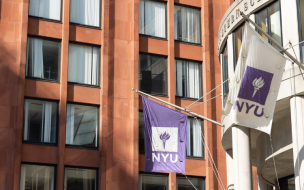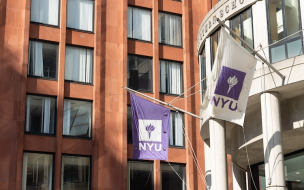The Cornell University SC Johnson College of Business two-year, full-time MBA offers the opportunity to attend the ninth-best business school in the world, according to the Financial Times, without the ultra-competitive admissions process of an M7 business school.
Read on for a snapshot of the Cornell Johnson MBA class profile: a competitive, tight-knit program for mid-career professionals who wish to gain hands-on experience during an action-packed tenure.
Cornell Johnson MBA class profile | Overview

Full-time, two-year MBA Class of 2026. GMAT score refers to 10th Edition. Data provided by Cornell SC Johnson College of Business.
Cornell Johnson is known for more intimate class sizes where students can create deeper connections and have more time to engage with faculty. The relatively small cohort—just 282 students—is unusual compared with other top US MBA programs.
Of the 282 in the class of 2026, 41% are women, 22% are underrepresented minorities, and 9% are US military. These are all down from 2025's entering class where 43% were women, 35% were underrepresented minorities, and 10% were from the US military.
The latest class also comprises students from a spectrum of nationalities. More than a third of the class (35%) hails from outside the US, representing a total of 34 countries.
Cornell Johnson acceptance rates
For a top business school, Cornell Johnson’s acceptance rate feels relatively achievable. At approximately 30%, the Cornell MBA acceptance rate is significantly higher than that of other top-ranked institutions. By comparison, Stanford Graduate School of Business MBA has an ultra-competitive 8.4% acceptance rate, and Harvard Business School MBA accepts just 13.2% of those who apply.
Cornell Johnson's acceptance rate is in a similar range to NYU Stern’s (31.4%) and Chicago Booth’s (32.6%), which are ranked 21st and 10th, respectively, by the Financial Times.
If you’re planning to apply to multiple top MBA programs, Cornell Johnson offers you the opportunity to attend a well-respected program with higher odds of admission—a win-win.
GMAT score requirement for Cornell Johnson
In the US, two-thirds of acceptances to leading business schools are secured with a Graduate Management Admission Test (GMAT) score. It remains the admissions test that business schools use to evaluate candidates. It is the ideal way for you to prepare for your program and demonstrate your ability to take on the rigors of an MBA to the admissions committee.
So as you start to research business schools, especially if you’re looking to apply to one of the most competitive, it would be a good idea to find out its average GMAT scores.
Considering Cornell Johnson’s prestige, it’s unsurprising that the MBA class of 2026 boasts a high median GMAT score of 710, using the 10th edition of the test. For those taking the 11th Edition of the test (from February 2024 onwards), this translates to around 655-665—and is within the top 10% of all scores.
While that score may sound intimidating, Cornell Johnson’s median GMAT score is lower than many of the top US business schools including Stanford, NYU Stern, MIT Sloan.
While a strong GMAT score isn’t the be-all and end-all of your MBA application, a good score will give you a stronger chance of admission.
Average GPA score for Cornell Johnson
The median GPA of Cornell MBA’s class of 2026 is in the high-yet-achievable range, at 3.4. Compared to the average GPA scores for top-ranked business schools, which tend to be above 3.5, Cornell’s admissions committee seems to allow room for brilliant, qualified students who did not earn straight As during their undergraduate careers.
Option of STEM-designated MBA
Cornell’s two-year, full-time MBA offers the option for students to earn a STEM MBA in management science. The STEM designation path’s curriculum emphasizes data analytics, technology, and other subjects integral to contemporary business leadership.
During their third semester, students will have access to over 80 specialized electives, as well as the option to take weekend courses at Cornell Tech in New York City.
This is noteworthy for international students, as those with an F-1 visa who are enrolled in a STEM-designated program currently become eligible for a STEM OPT (Optional Practical Training) extension upon graduation, allowing them to work in the US in an approved STEM field for up to 36 months—compared with the standard 12 months for non-STEM MBA grads.

Cornell Johnson offers a prestigious Ivy League MBA experience without the ultra-competitive admissions process of an M7 school, making it an appealing option for mid-career professionals seeking an immersive, hands-on business education.
With a small, tight-knit cohort of just 282 students, Cornell Johnson fosters close relationships between peers and faculty. The class of 2026 reflects a diverse mix of backgrounds: 41% women, 22% underrepresented minorities, 9% veterans, and 35% international students from 34 countries.
Cornell’s acceptance rate of around 30% makes it a more accessible option than elite programs like Stanford (8.4%) or Harvard (13.2%), while still offering an MBA ranked ninth globally by the Financial Times.
Career outcomes for Johnson MBAs largely follow the traditional MBA path, with most graduates entering consulting and finance. However, its STEM-designated MBA path enhances career opportunities, particularly for international students who can extend work eligibility in the US through STEM OPT.
For those seeking a top-tier business education with strong career progression and an Ivy League brand—without the intense competition of M7 schools—Cornell Johnson might just be the place for you.

RECAPTHA :
ea
61
98
72









